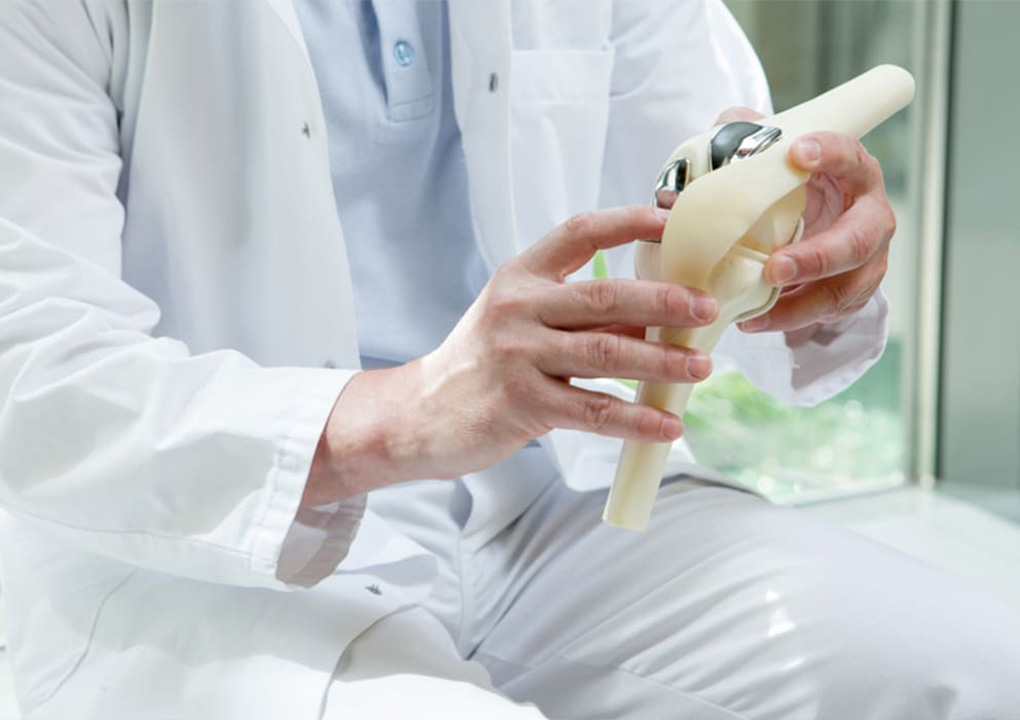You cannot move like you used to and it is becoming painful to walk the dog, climb a flight of stairs, or simply get out of a chair. Simple activities have become difficult to perform. You have tried medication, injections and physiotherapy. However none seems to work. If this what you are going through, you may need to consider a knee replacement surgery.

Also known as knee arthroplasty, knee replacement surgery is a safe and effective procedure for damaged knees from arthritis and injuries. The procedure aims to correct leg deformities, relieve pain, restore motion and help you regain the ability to resume normal activities again. What we like to say here in Singapore is to have the knee fixed with a “spare part”.
Knee replacement was first performed in 1968. Since then, significant improvements have been made in surgical materials, biomechanical engineering and surgical techniques. These have greatly increased the effectiveness and success of the procedure. During surgery, an orthopedic surgeon removes the damaged part of the knee and replaces it with an artificial joint made of metal or plastic. The artificial joint is then attached to the thigh bone, shin, and kneecap with a special acrylic cement.
What is Total Knee Replacement?
A knee replacement procedure is where the diseased surfaces of the knee are surgically removed, both at the femur (end of the thigh bone), the tibia (upper end of the shin bone) and in selected cases the undersurface of the patella (kneecap). The parts of the bone and cartilage which are removed are “replaced” with specialized metal components that recreate the surface of the joint. Finally, a medical grade plastic spacer is inserted in the space between to create a smooth gliding surface. The surgery usually takes about 1- 2hours to perform. The implants are carefully planned and chosen to maximize the outcome and function of the knee for the individual patient.
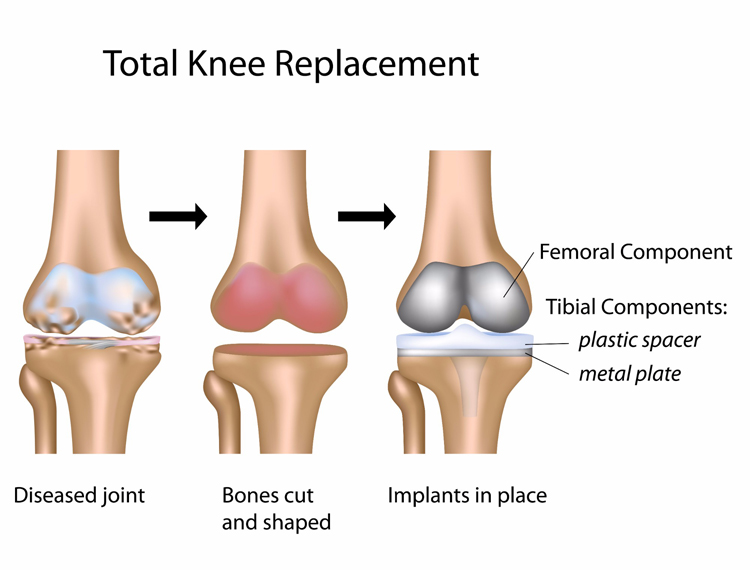
How long do these Knee implants last?
Based on historical data, most knee implants will last 15- 20 years with moderate use.
When would you consider having a Total Knee Replacement?
Having a total knee replacement is an important cooperative decision made between yourself, your family and your orthopaedic surgeon. There are many reasons why you may be recommended for a total knee replacement and most patients who have benefited from this type of surgery often have:
- Severe knee pain, stiffness or swelling such that walking, climbing stairs and daily activities become difficult. Simple tasks such as getting out of a chair or squatting would be hard to perform without pain.
- Pain in the knee causing weakness and frequent falls.
- Having pain at rest during the day or in the night. Getting out of bed after waking in the morning will be difficult due to stiffness in the knees.
- Chronic inflammation in the knee joint that does not improve significantly with medications or rest.
- Knee deformity- bowing of the knee inwards or outwards.
- Failure to improve despite having tried other conservative treatment options such as medicines, injection or other surgeries.
Suitability for Knee Replacement Surgery
There are no absolute age restrictions for knee replacement surgery. Recommendations for surgery are based on the individual patient’s condition and on their general health state. Most patients who undergo such surgeries are between the ages of 60-80 but such surgeries are successfully performed at all ages.
Types of Knee Replacement Surgery
Total Knee Replacement?
This is the most common form of knee replacement surgery where the orthopaedic surgeon replaces the surfaces of the thigh bone and shin bone that connects to the knee.
The left knee with a total knee replacement done earlier where a similar deformity was corrected.
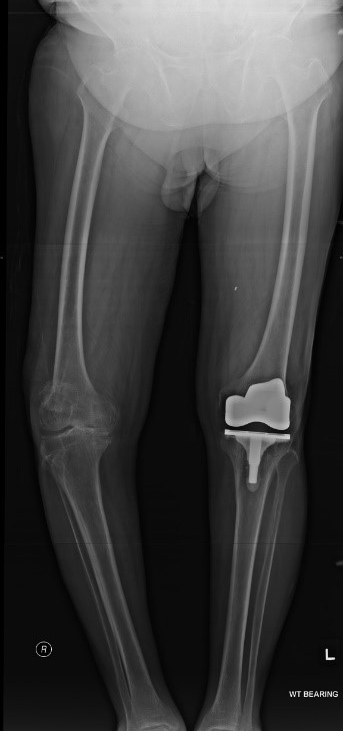
Deformity in the left knee due to osteoarthritis.
Partial Knee Replacement?
If only one side of your knee is affected, a partial knee replacement surgery may be a possibility. This procedure is also known as a unicompartment knee arthroplasty. This is a special type of knee replacement where only the part of the knee that is affected is replaced. The rest of the knee is left intact, including the ligaments and the meniscus on the other side. The procedure is done via a minimally invasive technique where there is less tissue injury blood loss and pain. Recovery after surgery is also significantly faster than having a total knee replacement.
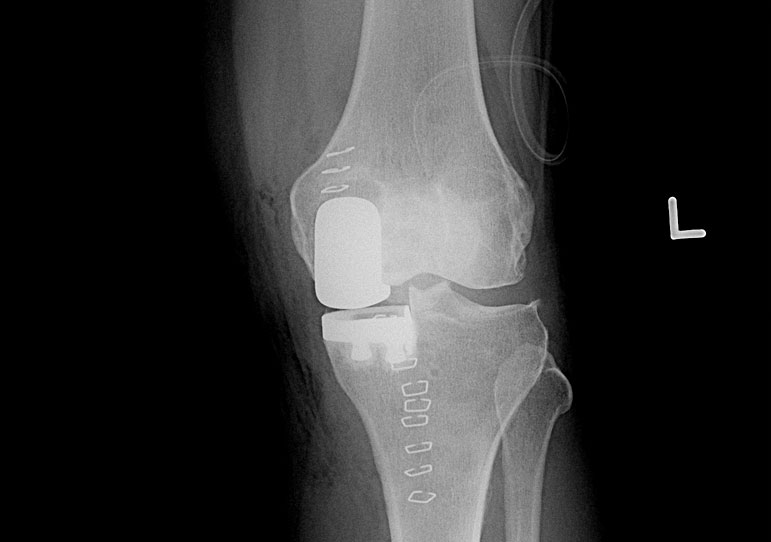
X-ray: A partial knee replacement of the inner compartment in the left knee.
Orthopaedic Examination in the Clinic
When you consult the doctor, he will gather information about your medical history and specific details about the condition of your knee. He will also examine your knees to assess the condition including the motion, areas of tenderness and overall leg alignment.
X-rays of the knees are commonly done to determine the degree and extent of damage and deformity in the knees. Other tests such as an MRI (magnetic resonance imaging) scan or blood tests may be required to further assess the condition of the knee.
The orthopaedic doctor will discuss and explain the results of the evaluation and discuss the treatment options available. He will also advice if a total knee replacement is the best option to treat the arthritis in your knees.
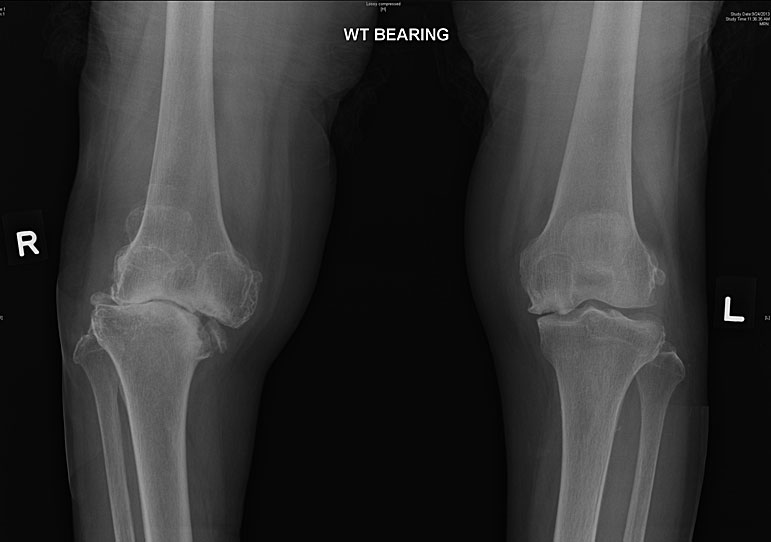
Bilateral knee xrays of a patient with severe arthritis in the knees

